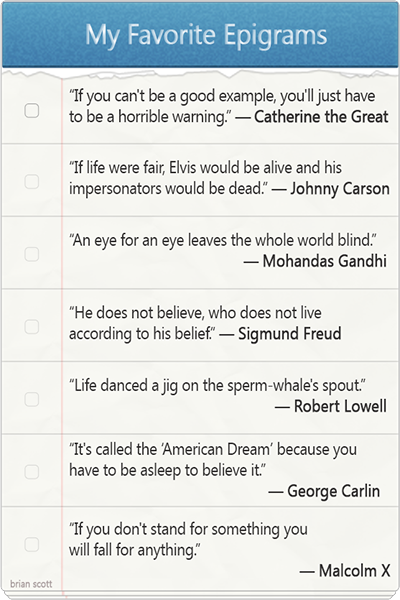If you’re unsure what an epigram is, you don’t have to feel bad about it. It can be difficult and confusing to define the epigram, because historically, writers have used it to describe a broad range of things. The first epigrams were verses used by the Greeks for the inscriptions on statues or other monuments to the dead. The Romans were the first to use epigrams as satirical devices, and William Shakespeare made them popular as poetic closed couplets. But modern epigrams are not confined to verse.
What is an epigram?
- An epigram is a brief and quotable statement. It can be satirical, paradoxical, humorous, or simply clever. The epigram is the one-liner of literature.

Most famous sayings that engage readers and make them ponder the meaning of what is said can be considered epigrams. Probably the most famous author of non-poetic epigrams is Oscar Wilde, who is also one of the most quoted writers of all time.
You’ve probably heard:
“I can resist everything except temptation.”
Or,
“To love oneself is the beginning of a lifelong romance.”
Oscar Wilde used these epigrams in his work to make it more dynamic, funny, and meaningful. The fact that so many of his epigrams are still quoted over a century after his death means he did it quite successfully.
Though many people still associate epigrams with poetry, using epigrams in a short story can make your fiction come alive with wit. How, then, do you actually come up with one? The answer depends largely on what you want to say.
- Look up famous examples of epigrams and see if you notice the patterns in how they are formed. Irony and paradox can make the audience think deeply about the true meaning of even the briefest epigram.
- If you can convey a message in a tongue-in-cheek way using only a sentence or two, the epigram can be a wonderful tool.
- Don’t make the mistake of using too many, though. Wilde’s most quotable work, The Picture of Dorian Gray, only contains around twelve true epigrams.
- Whether you use one in narration or simply have one of your characters be a bastion of punch lines, you want to do it sparingly.
What’s the secret to writing epigrams?

The real secret to writing epigrams is to say something that your reader won’t soon forget. In attempting to use a few epigrams in a short story, you could end up revisiting how you play with language altogether. It can be hard to craft a truly memorable epigram, but once you do, it’s guaranteed to stand out. So give it a try. After all, experience is the name we give to our mistakes. I bet you know who said that.




